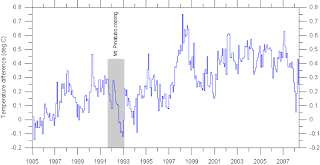Stratospheric Particle Injection for Climate Engineering (SPICE) is a project which aims to mimic the effects that volcanoes have on climate. Large volcanic eruptions have unequivocally been proven to reduce temperatures across the whole of the globe (Robock, 2000).
Recent evidence for this lies with eruptions such as Mt Pinatubo in the Philippines. After a substantial eruption in 1991, considerable amounts of tephra and 20 million tonnes of sulphur dioxide were ejected into the stratosphere. This gas is quickly converted to sulfuric acid aerosols which act in a similar way to ozone by absorbing short wave radiation from the sun. Although difficult to conclusively measure, Gobal Circulation Models suggest that temperatures decreased by between 0.2-0.5°C during the following two years (NASA)
The SPICE project aims to test the feasibility of using water as a substitute to SO2. Due to the great uncertainties in the effects of adding vast volumes of water vapour to the atmosphere, experiments will take place first at a relatively small scale. Water will be drawn up a pipe from the sea to a helium balloon acting as a platform at an altitude of between 10-20km. It will then be introduced into the troposphere (Natural Environmental Research Council)
But will it work...? At the moment this technique is seen to be the one with the most promise. It is by far the most economically viable as, past the stage of research and development, the platform and the water will cost relatively little (especially compared to the use of millions of tonnes of iron needed in the previously discussed ocean fertilisation). However, although this process is known to work naturally after volcanic eruptions, concerns lie with the lack of knowledge as to the effects that will occur through a constant rate of injection compared to the natural episodic injections.
What is not known is the extent of the temperature change that will occur and also for how long it will last. These are significant knowledge gaps that, fingers crossed, the upcoming experiments should help to shed light on. A further worry lies with the regional changes that might occur with other climate factors, not just temperature. Will rainfall be affected for example? Another issue is that Solar Radiation Management has no effect on atmospheric CO2 levels and therefore will do nothing to halt ocean acidification (The Royal Society report)
The first SPICE experiment was due to be undertaken last month but has been indefinitely postponed due to pressure by the UK population and an advisory panel. In my opinion, research is crucial and this might just be part of the answer that we’ve all been looking for!


No comments:
Post a Comment